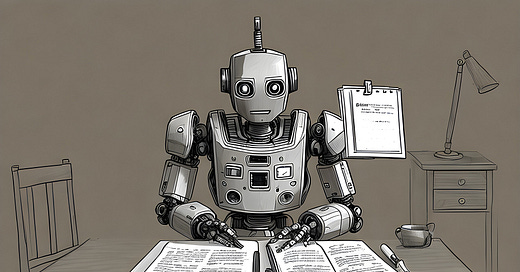Is ChatGPT killing human-to-human interaction?
Read why Q&A forums are important for the human connections, get an entire directory of ChatGPT prompts, and know how they solved the chicken and egg problem at Udemy
Hi folks 👋
This week, schools reopened in Chennai for new academic sessions after a mini break. (I wonder how kids play at school in this sweltering 35 degrees Celsius!)
It is now customary for my 13-year-old daughter to narrate her daily adventures at school.
Sitting on the kitchen platform and watching me make coffee for her, she’d tell me about her teachers, her friends, the goofy stuff they did at school.
During one of these sessions, she told me about a lesson she was studying at school. It was “The Fun They Had,” a science fictional story written by Isaac Asimov.
Set in the year 2155, it shows how children learn from machines that are referred to as ‘teachers’ from the confines of their homes.
Margie, the main character, loathes these machines. She discusses with her neighbor Tommy, about the times her grandfather lived in - when kids gathered at schools to study together.
Asimov depicts the ‘teacher’ as large and black and ugly with a big screen - meaning a computer.
It set me thinking - would the future really look like what he’s depicted?
Will our future generations know what it means to go to school?
That brings me to the biggest thing people are talking about - ChatGPT.
It has been 140 days since it was launched.
People have been using it to cough up marketing campaigns, appeal to traffic police to wriggle out of parking fines, write passively aggressive and firm email to airlines for delayed flights - the list seems endless.
It sure is a wonderful product and makes people work less.
But, what if it makes you think less?
Or, more importantly, what if it makes people talk to other people less?
That brings us to the post of the week.
The best LinkedIn post this week 🪶
If you’re not a coder, you’ve probably not used Stack Overflow. It is a great place for coders to query and get great answers to their code-related problems.
The thing that works for them is not the answer alone but also the human behind the answer.
I know a lot of coders who swear by Stack Overflow because it has rescued them from precarious situations.
But, with the rise of ChatGPT, coders may stop using Stack Overflow. Instead, they may use ChatGPT to get all the codes.
That’s why you should read what Peter Nixey says about the importance of human-to-human connections. And how it could be lost because we are pouring all our collective knowledge into a machine.
Because programmers won't be asking many questions on Stack Overflow. GPT4 will have answered them in private. Which means less demand for platforms like it.
Less demand for a product = less employees working for it.
Last week, GitHub, a platform similar to Stack Overflow, laid off their entire engineering team in India.
What if it happens to other Q&A platforms like Quora, Reddit - places where people help other?
Or, will it push us to the brink that we are forced us to meet each other face-to-face (like what Peep Laja says)?
Things are evolving at breakneck speed.
And usually when that happens, things break.
It is food for thought for all of us.
The best marketing tips on LinkedIn this week 📝
If you’re looking for growth opportunities, then speak to customers who have churned. Joshua Fryszer explains who you should speak with depends on what you’re trying to achieve.
Speaking of ChatGPT, Alex Velinov gives out an entire directory of prompts by experts on topics like e-commerce product descriptions, cold email, LinkedIn carousels, etc. Alex has been curating such ChatGPT artefacts for weeks now.
If you’re still using product videos to get people sign up to your tool, you’re missing out 5X. Instead, A/B test an interactive demo, says Anna Furmanov. (Simple psychology lesson: make them try the product).
How do you know which marketing idea needs more digging? Jess Cook says social is her favourite “proving ground” before she decides to pursue it.
The best sales tips on LinkedIn this week 😎
Show your prospects that you have a brain. Show them that your brain can research about them, says Will Allred. Don’t mistake personalisation for slapping a cooked-up story on a template.
In sales, there’s nothing called objections. Instead, you come across resistance and it is different from objection, explains Josh Braun. Find out why you need to join the resistance.
What’s cooking in SaaS and startups this week? 🍳
If your product is not good enough to self-onboard in a few seconds, then don’t bother giving out free trials. Besides, it may get you a lot of low-end users who won't pay $50K/$100K for it, says
.Gagan Biyani explains how they solved the chicken and egg problem at Udemy. (Hint: staying frugal initially gave them the idea).
Until next time folks! Missed our earlier coverage? Binge read it now:
Peace and Love 🙏
Why are you receiving this email?
Quite simple! You were probably blown away by how much we want you to know about SaaS marketing. So, you signed up for it via our social posts (or you asked us to add you).
Now, do us a favour please. Share this with the world around you. ♥️
P.S. It’ll take you only 15 seconds to share. It takes us an entire week to curate this.
Banner image by ThankYouFantasyPictures from Pixabay.




